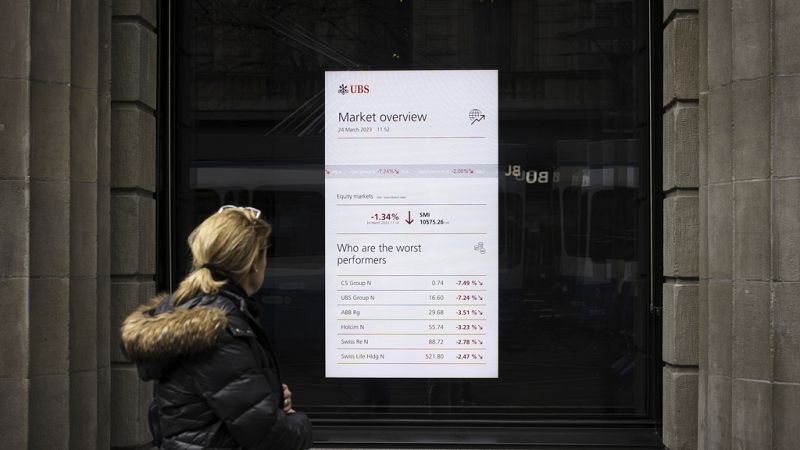Switzerland scrambles to ink trade deal with US amid certain 'economic blow' due to tariffs

The Swiss government announced on Monday that it is preparing a "more attractive offer" in its trade negotiations with the United States, in a bid to avoid high 39% US tariffs on its imports, which would severely damage the export-driven Swiss economy.
In an official statement following an emergency government meeting, the Federal Council - the executive body of the Swiss government - confirmed its intention to continue talks with Washington, even after US President Donald Trump's 7 August deadline for the new tariffs to come into force.
The government said in a statement: "Switzerland enters this new phase ready to present a more attractive offer, taking US concerns into account and seeking to ease the current tariff situation."
While pledging to continue dialogue and secure fair trade treatment compared to its main competitors, the government did not disclose the details of the offer and stressed that it is not currently considering countermeasures.
An unexpected blow for Switzerland
Switzerland was caught off guard on Friday by the US administration's decision to impose some of the highest tariffs as part of Trump's policy to restructure global trade. The decision has caused widespread concern in economic circles, with industry organisations warning that tens of thousands of jobs are threatened by the new tariffs.
It is estimated that the tariffs, which come into effect next Thursday, will affect about 60% of Swiss exports to the United States, leaving few options for Bern, which considers Washington its largest market for its exports of medicines, watches, machinery and chocolate.
The Swiss government declined to comment on whether President Karin Keller-Sutter would travel to Washington for direct talks, a proposal made by a number of officials, including Nick Hayek, CEO of watchmaker Swatch.
According to economist Hans Gersbach of the ETH University in Zurich, a 39% tariff could reduce Switzerland's GDP by between 0.3% - 0.6%. If the pharmaceutical sector, which is currently untouched by the tariffs, is included, the contraction could exceed 0.7%, while long-term disruptions could reduce GDP by more than 1%.
Nomura expects the escalation to prompt the Swiss National Bank to cut interest rates at its next meeting in September.
US accusations of 'unilateral trade relationship'
The White House justified its decision to impose tariffs by accusing Switzerland of not making "meaningful concessions" on the issue of removing trade barriers, describing the current relations between the two countries as "one-sided".
On the other hand, Swiss officials and economists expressed surprise that their country was targeted by this measure, despite the depth of trade relations between the two sides.
The Swiss statement noted that the volume of bilateral trade has quadrupled over the past 20 years, while Switzerland is the sixth largest foreign investor in the United States.
He also pointed out that Switzerland had unilaterally abolished all customs duties on industrial goods as of 1 January 2024, allowing more than 99% of US goods to enter the Swiss market without duties.
Trade deficit at the centre of the crisis
Trump blames the current regime for a trade deficit estimated at $1.2 trillion (€1.04tn).
According to official data, Switzerland recorded a trade surplus with the US of 38.5 billion Swiss francs (€41.2bn) last year, putting it under the microscope as part of Trump's efforts to reduce the deficit.
Swiss President Keller-Sutter told Reuters on Friday: "The president is very focused on the trade deficit, because he sees it as an economic loss for the United States."
The US decision has angered Switzerland because of what it sees as "discrimination". Government data shows that the European Union, Japan and South Korea - all of which have larger trade surpluses with Washington - have been able to negotiate tariffs of no more than 15%.
Figures show that the EU's trade surplus with the US is about $235bn (€204bn), compared to $70bn (€61bn) for Japan and $56bn (€49bn) for South Korea.
Options on the table
Swiss Economy Minister Guy Parmelin hinted over the weekend that the government is open to reviewing its offer, talking about options including buying US liquefied natural gas and increasing Swiss investments in the US.
However, some politicians have called for a stronger response, including one who suggested cancelling a 6 billion CHF deal to buy F-35A Lightning II fighter jets from the US.
In financial markets, the main Swiss stock index (.SSMI) fell 0.4% on Monday, bucking the positive trend in Europe where the STOXX 600 index rose 0.8%.
Shares of luxury watch companies such as Richemont and Swatch fell amid volatile trading. Richemont was down 1.5% after a 3.5% drop on the day, while Swatch was down 1.8% after a 5% loss earlier in the day.
On the currency front, the Swiss franc was the worst performer against the dollar, rising 0.4% to CHF0.8073, nearing a one-month high.
Today

